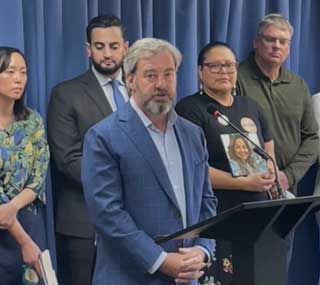Lansing Update: Update: Gun Bills Signed, ID for All Introduced
Posted April 14, 2023
In this update:
- Expanded Gun Background Checks, Safe Gun Storage Requirement Signed into Law
- Bills Introduced to Promote Dignity for the Undocumented
- Fourth Attempt Begins to Advance MCC-Backed Abuse Prevention Package
Expanded Gun Background Checks, Safe Gun Storage Requirement Signed into Law
Legislation to expand background checks to all gun purchases and require safe storage of guns—policies supported by Michigan Catholic Conference (MCC)—were signed into law by Gov. Gretchen Whitmer this week.
The bills implementing those policies previously passed the Legislature as part of a three-part gun safety reform package supported by MCC in the interest of helping save lives by ensuring guns are properly stored and are kept from people who should not have them.
The third piece of the package would create a process to temporarily remove firearms from people who may cause themselves or someone else harm. Those bills—creating what’s known as extreme risk protection orders—passed the House this week and head to the Senate next. The applicable bills moving in the Legislature are House Bills 4145 through 4148 and Senate Bill 83.
The bills signed into law by the Governor are Senate Bills 79 through 82 as well as House Bills 4138 and 4142.
MCC supports this legislation while acknowledging the underlying causes for violence must still be addressed beyond gun safety.
Bills Introduced to Promote Dignity for the Undocumented
Legislation to allow for undocumented persons in Michigan to apply for driver’s licenses was introduced this week with the support of MCC, which believes the measure is intended to promote human dignity and safe driving for all residents.
MCC has been advocating for this policy for several legislative sessions and was among the groups invited to speak in support of the bills at a press conference this week.
MCC believes this policy aligns with the Church’s principle of upholding the human dignity of immigrants because it ensures people can legally drive to work, school, church, the grocery store, medical appointments, and other daily activities that impact the health and well-being of children and families.
In supporting this policy, MCC is not encouraging illegal immigration or open borders, nor is this policy about giving the undocumented the right to vote.
The reality is that for people seeking legal recognition, the immigration process to receive legal documents is long, cumbersome, and complex. People who are undocumented for whatever reason—whether in the process of getting work visas and becoming a citizen, or legal immigrants who haven’t received their verification documents because of bureaucratic delays—still need driver’s licenses to function in daily life.
Getting the driver’s license bills signed into law was highlighted as one of MCC’s priorities for the 2022–2023 legislative session as outlined in the release of the latest Blueprint for the Common Good.
Legislation to enact the driver’s license policy has been introduced in both the House and the Senate and now awaits committee consideration.
Fourth Attempt Begins to Advance MCC-Backed Abuse Prevention Package
Legislation intended to proactively prevent sexual abuse committed under the guise of medical treatment earned support from MCC this week during its first committee hearings.
The package of bills in both the House and Senate are a reintroduction of similar legislation that MCC has previously supported. A version of this policy has been introduced in each of the past four legislative sessions stretching back to 2018.
The legislation makes it a crime to abuse a patient under the guise of medical care, or misrepresent that sexual contact is necessary for a patient’s health. The bills also require parental consent for certain sensitive procedures conducted on children, among other measures intended to prevent medical professionals using their positions to take advantage of children.
Bills received hearings in both the House Judiciary Committee and the Senate Civil Rights, Judiciary and Public Safety Committee this week, but no votes were taken.
